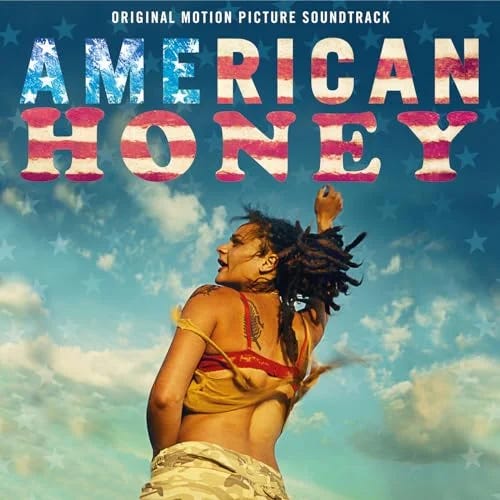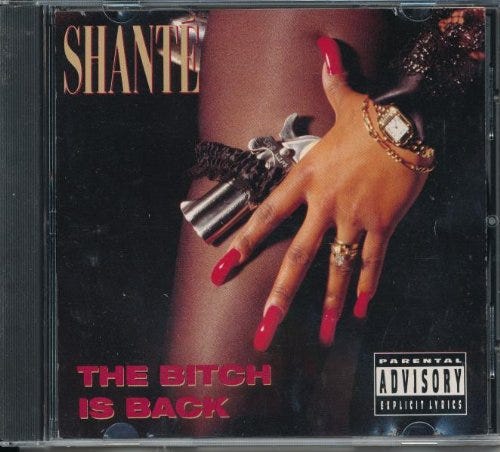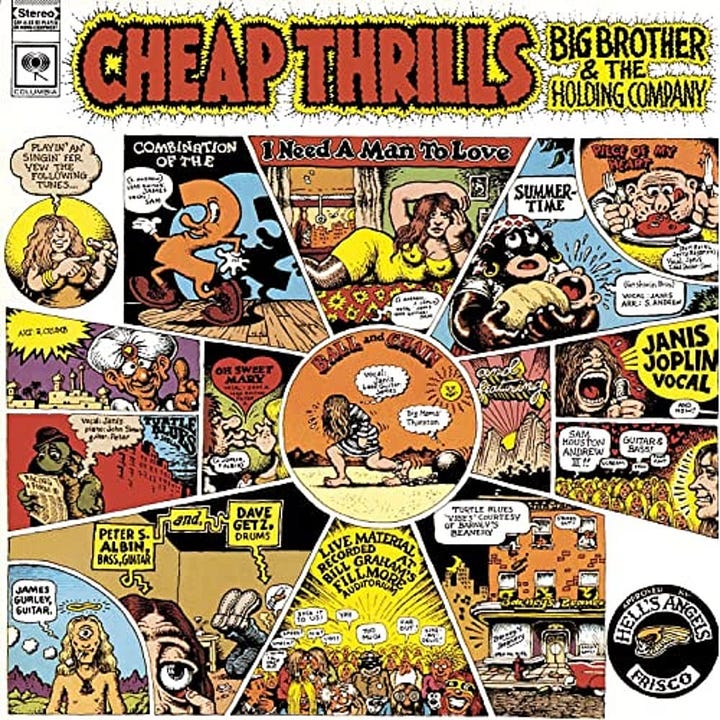Xgau Sez: May, 2024
'Honey' with some schlock, the b-word, namesake kaffe, dear old Dartmouth, Vampire vibes, and 1968 albums (slight return).




Having just watched the spellbinding American Honey, knowing nothing about it other than your glowing review of its soundtrack, I was surprised to note the eponymous song by Lady A was prominently featured. In a previous question I wrote to you about Lady A’s name change, where you described them as a “dreadful band” of “Nashville schlock” (August 2020), I was surprised the inclusion of this song in the soundtrack didn’t dent your enjoyment of it. Which leads me in a rather roundabout way to my real question, which is: can an album be an A+ without being strictly “perfect?” — Adam Montgomery, London, UK
Of course a schlocky band can come up with a first-rate song. I love that soundtrack—it’s among my most-played albums even though it never came out as a physical. So I hereby recommend it to anyone who’s never heard it, and yes, the movie is also terrific. Lady Antebellum benefited enormously in this context by providing the soundtrack with its title song. They also distinguished themselves by changing their name to Lady A in 2020 after being bombarded with criticism for the pro-Civil War implications of their name. Shortly thereafter (Wikipedia’s is a good source on the details) they found themselves in a lengthy dispute with a Black blues singer yclept Lady A, legal name Anita White. Sampling White’s top five blues/bluesy songs on Spotify, she’s actually damn good—in my opinion better by far than Lady Antebellum/Lady A the country warhorses.
I was wondering as to your thoughts on the question of whether “problematic” lyrics can actually enhance the quality of a song. I love a lot of the pre-war Delta blues, but a majority of those songs have questionable lyrics when it comes to male/female relations. But for some reason the violence and sexism, are to me integral to the songs’ quality. Perhaps this is because blues often has an eerie or desolate atmosphere which fit such lyrics. On the other hand, I am put off by a lot of hip hop for its use of “bitch” and its casual violence towards women. Even though hip hop at times boasts a similar atmosphere as blues. At the end of your review of the debut Ramones album you make the statement: “This makes me uneasy. But my theory has always been that good rock and roll should damn well make you uneasy.” You use “Midnight Rambler” as example of a good kind of uneasy. Yet you draw the line, understandably, at “Brown Sugar.” How do we make these distinctions? — Bojan, Leerdam, The Netherlands
I’d need to listen to a lot of blues records before working out a position on that conundrum, but as to “bitch” in hip-hop I’m basically against it without boycotting it—the word’s tone does fluctuate radically in that context plus don’t expect me to forget much less dismiss Roxanne Shante’s great lost The Bitch Is Back. In addition let me note that my brief review of the Stones’ 2015 Brussels Affair suggests that it’s time to remove “Midnight Rambler” as well as “Brown Sugar” from their canon.
I have a question about your name, “Christgau.” I looked a little and apparently “gau” is German/Danish (they share small border) rooted, meaning “land,” while “Christ” of course is what it is. So, I was wondering if perhaps that kind of far-reaching humanism and compassionate virtues associated with Christ, and of course that you were from a born-again Christian household, influenced your democratic sensibility, your politics, your own humanism, etc. The values I feel in your writing. Maybe I'm too stressed out to formulate a concrete question out of this. Just a reflection. I'm sure you get it. — Piotr, Manhattan
I have no doubt that my Christian upbringing played an active role in shaping my humanism. ”Love thy neighbor” was definitely a watchword at First Pres even if not all the parishioners lived by it. Also, my church library was one of the first places I found books about ideas, and I read several of them, which helped make me an intellectual, though I always preferred both fIction and books about baseball. But given the extent to which the leftist humanism of dozens upon dozens of my Jewish friends moved me in that direction, I identify more with that strain of secular humanism. As for the name “Christgau,” there’s a Danish brand of coffee called Christgau—an empty bag of it hangs from my office door. Then again, so does the remains of an envelope addressed to Rabbi Robert T. Christgau. In either German or Danish or maybe both the suffix “gau” seems to mean something like region or county, and I seem to recall that under Hitler certain states or geopolitical entities were called “gaus.”
Hi, I’m currently enrolled at Dartmouth College and I recently noticed that you went here as well. How was your time at Dartmouth? Any specific interesting memories? Did you participate in Greek life? Did any classes here make you want to go into music criticism? — Joseph T. Kuester, Atlanta, Georgia
An entire chapter of my memoir, Going Into the City, is about Dartmouth, and I assume you would find it enlightening. In NYC I was only allowed to apply to three colleges plus a CUNY, and I no longer remember whether Cornell and Hamilton wanted me, but Dartmouth gave me a scholarship, maybe because I had a great-uncle who attended on a football scholarship, didn’t graduate (blew a knee, for one thing), then became an alumni association heavy of some sort; he was also a drunk who was run over by a bus in Cooper Square a few blocks from where I’ve resided for half a century. So he might have helped. In addition my College Boards were off the charts though my high school grades weren’t, and math chairman although not-yet-prexy John Kemeny called me in to bawl me out for choosing the “gut’ Math 3-6 option instead of Math 1-2 because it was the easiest “science” “sequence” and all I wanted to do was study literature and philosophy, which I then did for four years. My grade average was good-not-great because I have no knack for foreign languages—cum laude and Phi Bet but not by much. But I absorbed a lot of literature and philosophy there and made a few lifelong friends in English Honors and on the fringes of what passed as the undergraduate bohemia. I was the youngest member of my class.
A couple of years back I was going through a Vampire Weekend phase propelled partly by your writings. During such time I came across young Ezra’s blogspot page titled Internet Vibes, in which he aimed to “categorize as many vibes as [he] can.” The web page offers plenty of insight into the young man’s character, his humor and quirks, his musical and intellectual inquietudes — and it did turn me on to some interesting music. On October 12, 2005, he posted “CRITICAL BEATDOWN,” defending Billy Joel’s music and sensibility against your judgements, going through some of your Piano Man reviews, and concluding that you are a “1-ST CLASS POSEUR,” a “CLASSIC TYPE-A HATER,” and that “GRADING ALBUMS like HOMEWORK is LAME,” amongst other reflections about criticism in general. No antagonizing intended, I just wondered if you were ever aware of this, and about your view of Ezra’s maturation and development as a songwriter, human, etc. which I understand seeps as subject of your reviews of his. — Ignacio Nuez, Santiago, Chile
What can I say? It’s the rare artist who has any feel for criticism as a craft or calling and I’m even better at mine than he is at his, about which I’ve often written positively plus there’s a big piece about his band in Is It Still Good to Ya? Maybe you should buy yourself a copy and Xerox the VW piece and send it to him even if you don’t like it, which I’d make a 50-50 proposition.
What are your favorite albums of 1968 and would any from my list below make yours? — Jack Westin, St. Louis
The Band: Music From Big Pink
The Beatles: The White Album
Big Brother and the Holding Company: Cheap Thrills
James Brown: Live at the Apollo Volume 2
Buffalo Springfield: Last Time Around
The Byrds: Notorious Byrd Brothers
Johnny Cash: At Folsom Prison
Leonard Cohen: Songs of Leonard Cohen
Cream: Wheels of Fire
Creedence Clearwater Revival: Creedence Clearwater Revival
Marvin Gaye: In the Groove
Buddy Guy: A Man and the Blues
Jimi Hendrix Experience: Electric Ladyland, Axis Bold as Love
J.B. Hutto & His Hawks: Hawk Squat!
Jefferson Airplane: Crown of Creation
Taj Mahal: Taj Mahal
Mother Earth: Living With the Animals
Elvis Presley: Elvis
The Rolling Stones: Beggars Banquet
We have similar tastes. Doing a best of ‘68 list would be a week’s work I am reluctant to undertake, but I can say that the only album on the list I think of as way overrated is Cream’s Wheels of Fire and a replay might conceivably change that (and I’m not a big fan of Jefferson Airplane’s Crown of Creation either). But the only ones I’m pretty sure I’ve played for pleasure or something like it—usually what I’ll call unnecessary research comparison—since say 2015 are, in guesswork descending order: Cheap Thrills, Beggars Banquet, Electric Ladyland, The White Album, At Folsom Prison, and conceivably Songs of Leonard Cohen. Not sure I own or therefore know In the Groove. (Motown didn’t mail out review copies back then.)



